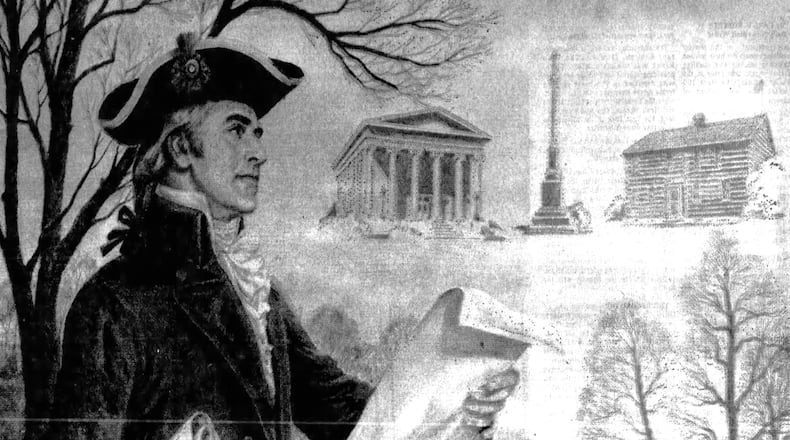Some might even be surprised to know that Dayton reportedly never once set foot in this city. Or that he was the youngest signee of the U.S. Constitution.
Here are a few more things you might not know about the man behind the city’s name.
Early life
Jonathan Dayton was born in New Jersey on Oct. 16, 1760. During his early schooling, he was classmates with Alexander Hamilton.
He attended the College of New Jersey (now Princeton), where he was classmates with Aaron Burr. His father was Elias Dayton, who later would become Colonel of the Continental Line during the Revolutionary War.
Soldier
When the Revolutionary War broke out in 1775, Dayton enlisted and served under his father, who commanded the 3d New Jersey Regiment.
Dayton was just 15 years old when he became a soldier, and he was a captain in the Continental Army by age 19.
He participated in the battles of Brandywine Creek and Germantown.
In October 1780, he was captured by the British but was released after several months. Dayton then joined the 2nd New Jersey Regiment as a captain and fought in the Battle of Yorktown.
Family
Dayton was married to Susan Williamson. They had three children: Susannah, Elias and Hannah.
The family lived at Boxwood Hall in New Jersey, which at the time was an 18-room Georgian mansion.
Politician
Dayton was a member of the Federalist party.
From 1787 to 1788, he served as a delegate from New Jersey to the Congress of the Confederation.
As a member of the committee that created a federal approach to national government, Dayton helped in establishing the Electoral College and a bi-cameral legislature. Dayton became the youngest, at age 26, to debate, draft and sign the U.S. Constitution.
Dayton became a member of the U.S. House of Representatives from New Jersey’s at-large district from March 4, 1791 to March 3, 1799.
He served as the third Speaker of the U.S. House of Representatives from Dec. 7, 1795 to March 3, 1799.
Dayton then went on to become a U.S. Senator from New Jersey from March 4, 1799 to March 3, 1805
Tried for treason
Dayton was a longtime friend of Burr from their college days.
Burr served as the third vice president of the United States from 1801 to 1805 during Thomas Jefferson’s first presidential term. Burr is also remembered for his famous fatal gun duel with Alexander Hamilton.
In 1806, a letter surfaced, written in code, that seemed to hint of a plan by Burr to establish a new nation in the Southwest, including Kentucky, Tennessee and Mexico, where Dayton and Burr had toured together. Some believed that Dayton actually was the person who wrote the letter.
Dayton was listed as a co-conspirator with Burr when the two were arrested and charged with conspiracy to commit treason. Dayton was indicted on June 25, 1807.
When Burr was acquitted, the two were both released.
After the trial, however, Dayton’s national political career was ruined.
Land speculator
When Israel Ludlow surveyed and platted the town that would become Dayton in 1796, he looked for investors to take ownership of the area. Jonathan Dayton was one of those investors. At the age of 32, Dayton bought 248,540 acres of what would become the Miami Valley.
The pioneer settlement at the mouth of the Mad River was named “Dayton” by Ludlow. The story is that Dayton’s name “had the most pleasing sound” of the purchasing partners. Another story is that Ludlow owed money to Dayton, which might or might not have been a coincidence.
The other investors were Ludlow, Arthur St. Clair and James Wilkinson, who have streets in the city named in their honor.
Dayton the city was incorporated in 1805.
Dayton thought the city, carved from a much larger Dayton Twp., would be a key travel point along the trade route to Cincinnati.
Interesting facts
There is no monument of Jonathan Dayton in Dayton. The monument at Main Street and Monument Avenue is a monument to soldiers of the Civil War topped by Pvt. George Washington Fair.
The Dayton Art Institute has a portrait of Elias Dayton in its collection, often mistaken as the namesake of the city. That Elias is Jonathan’s son, named after Dayton’s father.
Quote
“Each individual takes a different route to happiness; and being the best judge of his own case, has a right to do so. One mode of living and one system of pursuits will not produce every man’s happiness.” — Jonathan Dayton
About the Author




